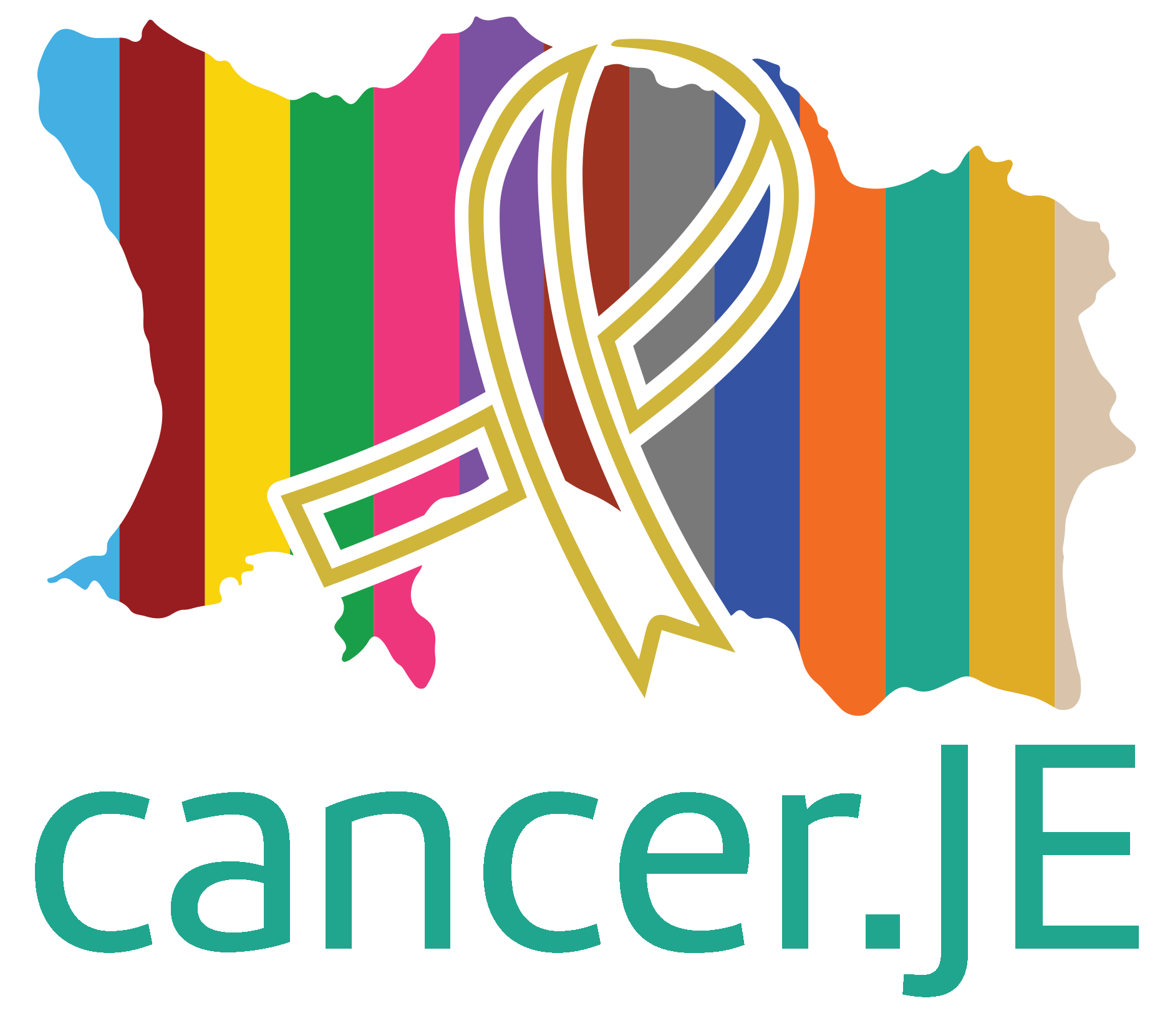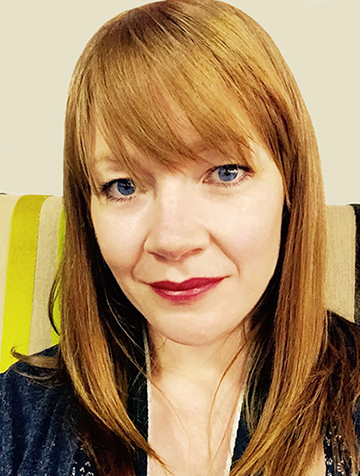
- Life Before Diagnosis
- The Lump
- Seeing the GP
- Family History
- Breast Clinic
- Mammography
- Reaction/Feelings
- Official Diagnosis
- Oncology
- Chemotherapy
- Post-chemo
- Genetics
- Surgery
- Progression
- Chemotherapy (again)
- Today

Life before cancer diagnosis
Before cancer my life was finally perfect.
At 30 I met Joe at university, we studied different sciences. I moved from Scotland in 2008 to join him. I was part of the team selected to found Jersey Recovery College. That was a real privilege. The college launched in 2017 and Joe and I married that summer. We then started development on our house.
Early 2018 I resigned from work as a scientist with the States of Jersey. I was looking forward to a short break after my notice period, then finding a new job.
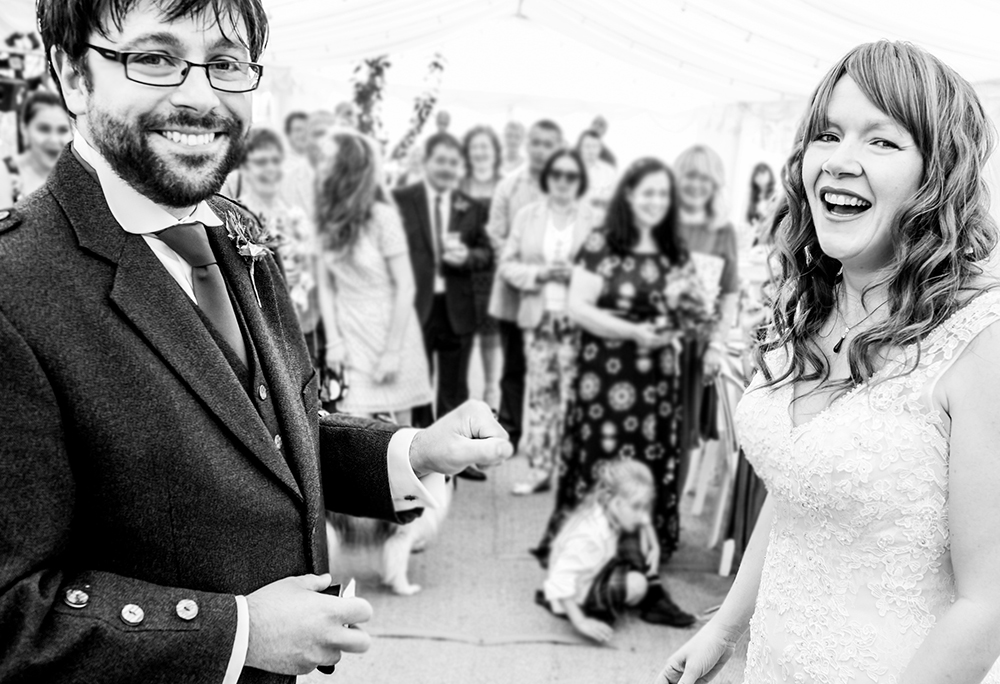
Joe & Lorna's wedding July 2017
The lump
End of March I was out with colleagues celebrating that a group of us were leaving. Later, preparing for bed, I caught sight of a flattening on the underside of my breast. It was almost imperceptible. I kept questioning if it was actually there. I did monthly self-exams but checked again anyway and found a tiny lump. That finding triggered a panic attack.
Seeing the GP
My husband phoned the GP as soon as they opened. They saw me early the same day. It was set in my mind that I wasn't leaving there without a referal to the Breast Clinic. The GP couldn't feel the lump. But they referred me to the clinic to discuss the possibility of early screening.

Family history
My mum had breast cancer in her early 40s. She then had a different type at 60. She never had any of the lifestyle risk factors. We were sure there was a genetic element. But going by NICE guidelines we weren't eligible for genetic screening. Thankfully treatment cured both of mum's cancers.
The Breast Clinic
I attended the clinic around 2 weeks later. The Breast Surgeon couldn't find 'my' tiny lump but detected a large lump. They phoned Mammography to request an urgent appointment.
Mammography
Not even 48 hours had passed when I got the phone call. Could I get to the hospital in 10 minutes? They could fit me in. My colleagues covered the rest of my shift and I walked over to the hospital. With this call coming so soon I knew the Surgeon was confident what he saw was cancer. I phoned my husband and he left work to come meet me. He worked in Trinity though.
Staff took me straight through for a mammogram. Then the Consultant Radiologist did an ultrasound. He took a couple of biopsies. But he was confident enough from the scan to tell me that I had Invasive Ductal Carcinoma. It was at least stage 2, but could be stage 3.

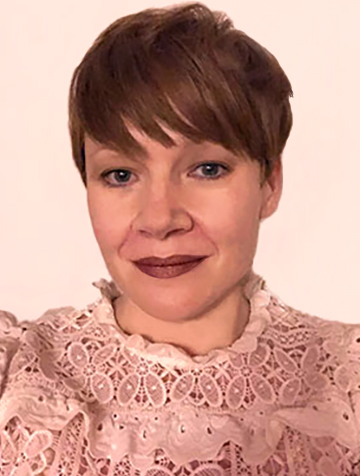
Pre-chemo haircut
My reaction
I remember my first two thoughts. The first was being glad my husband hadn't yet arrived. It meant I got to tell him myself in private. The second was that my family would now be eligible for genetic testing. My mum and I both having it young meets the NICE guidelines. I was so relieved. Finally we would get proof of what we had long believed.
My feelings
With those two thoughts out the way I slipped straight into practical mode. I had to get back to work. I had to find somewhere quiet to phone my family.
I realise I was lucky because I knew the minute I found the lump. So I had informed my family at every stage since then. I couldn't have them hearing a cancer diagnosis out of the blue. They got the managing expectations approach from me.
Also I'd had the mini-drama when I found the lump. Now I needed to get on with preparing for what was coming and keeping some control over the situation.

Breast cancer has 4 stages. Stage 1 is the earliest. Stage 4 is the most advanced. Sometimes people refer to 'stage 0'. This is when the cancer cells are still in the ducts or lobules. It also has 3 grades. Grade 1 is the slowest growing. Grade 3 is the fastest growing.
I was going to lose my hair so I cut it short. Cold-capping was an option but I get hemiplegic migraines so didn't want it. My hair fel out very fast, so I shaved it after cycle 2.
I always felt good on treatment day and a couple of days after. That was handy, it meant I could drive myself to and from treatment. There were some side effects on the FEC but nothing too bothersome. They got easier with each cycle. While on the T chemo I developed mobility and balance problems. It now seems a pre-existing condition was coming to the fore. We don't know yet exactly what it is.

In the UK 14% of women* will get breast cancer before turning 90. But having a BRCA2 mutation means their risk of getting it before age 70 ranges from 50% to 85%. It increases their risk of getting ovarian cancer too. For men* the mutation increases their risk of breast cancer and prostate cancer.
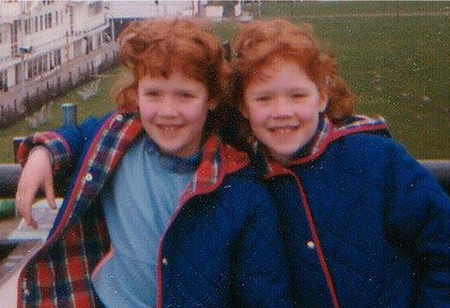
Al & Lorna as kids
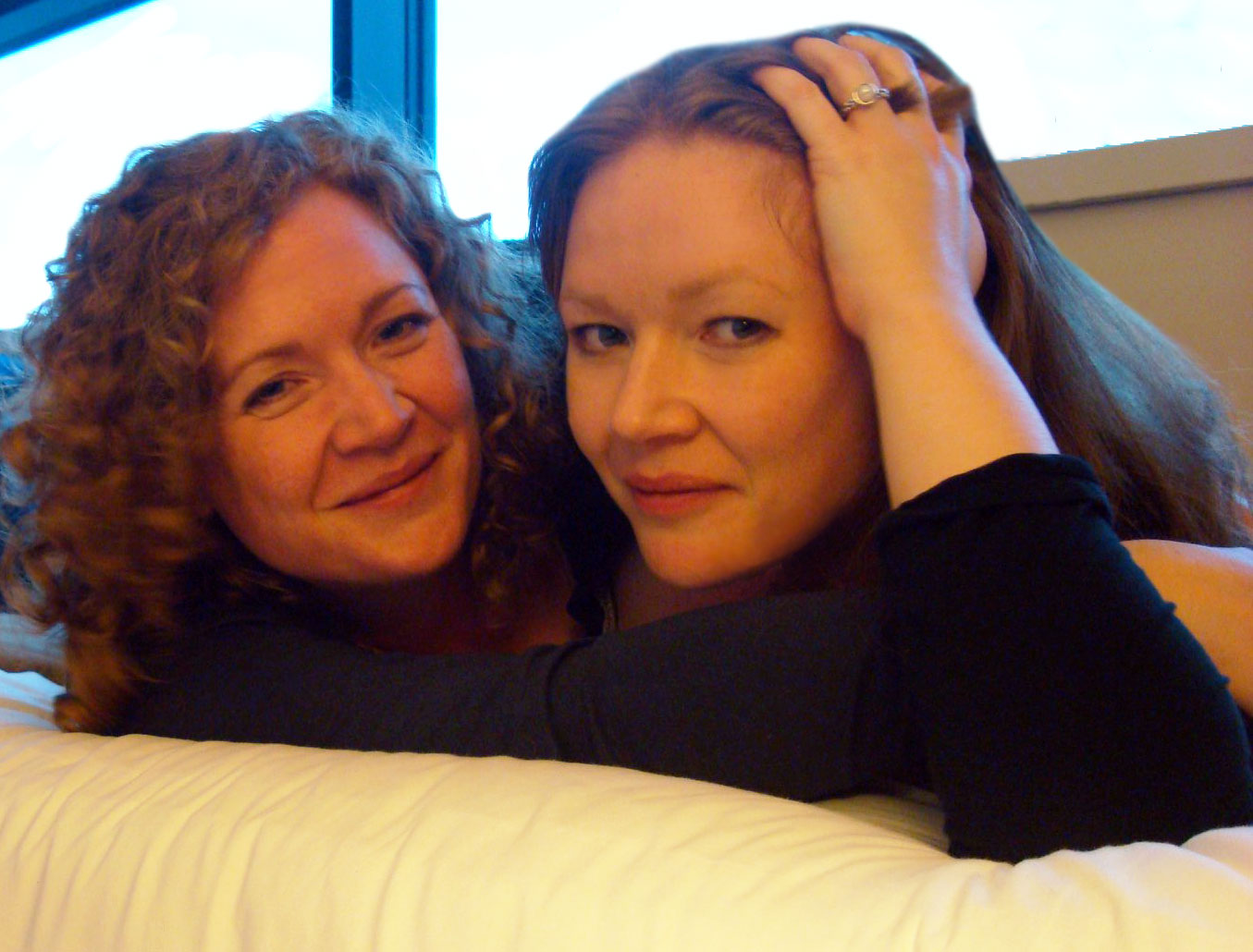
Al & Lorna
For the first time in my life I wished I wasn't an identical twin. My results were her results. My increased risk of various cancers was now also her increased risk. I had checked with her when they did the test so I already knew she wanted to know 'our' results.
The confirmation was also a relief. Genetic testing was now available to my mum and sisters. They could end up having the chance of preventative surgeries.
Because my mum had the mutation her side of the family were eligible for testing. Although still a relief, that was a bit more difficult. They were getting on with life, keeping abreast of how I was. Suddenly they faced a potentially life-changing decision. They were great about it, but I felt to blame for the disruption to their lives.

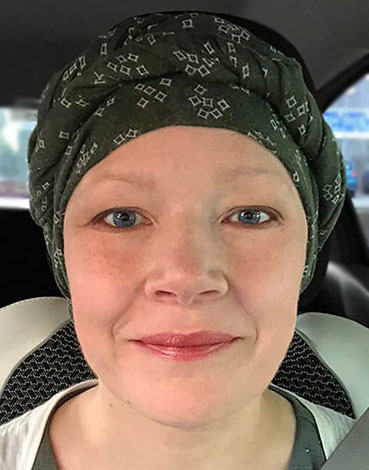
headscarf
Surgery went well with the mastectomy and reconstruction. They also removed 10 lymph nodes from my underarm. Recovery went well too. I did develop 'cording' (axillary web syndrome) but the physiotherapist sorted that. And I had a couple of visits to the Breast Clinic to drain a build-up of fluid under the skin (seroma).
Now the plan was for radiotherapy in January 2019 followed by targeted treatment. And I would have my ovaries taken out to remove the risk of ovarian cancer. In the meantime I started taking Tamoxifen.

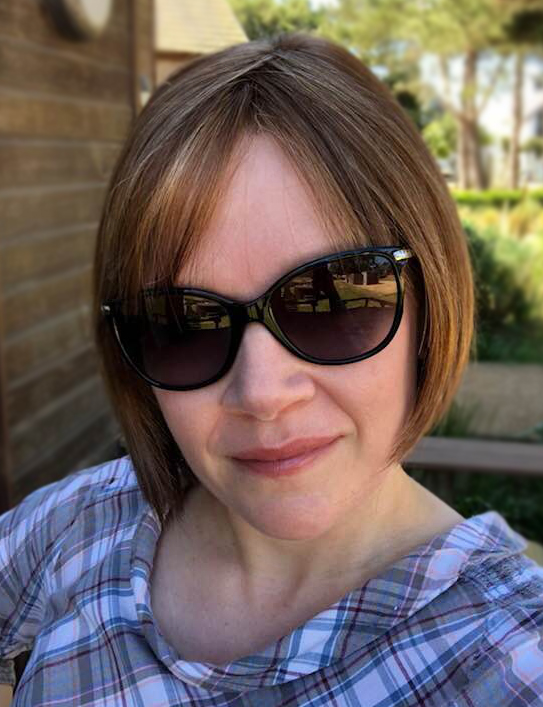
1st wig - synthetic

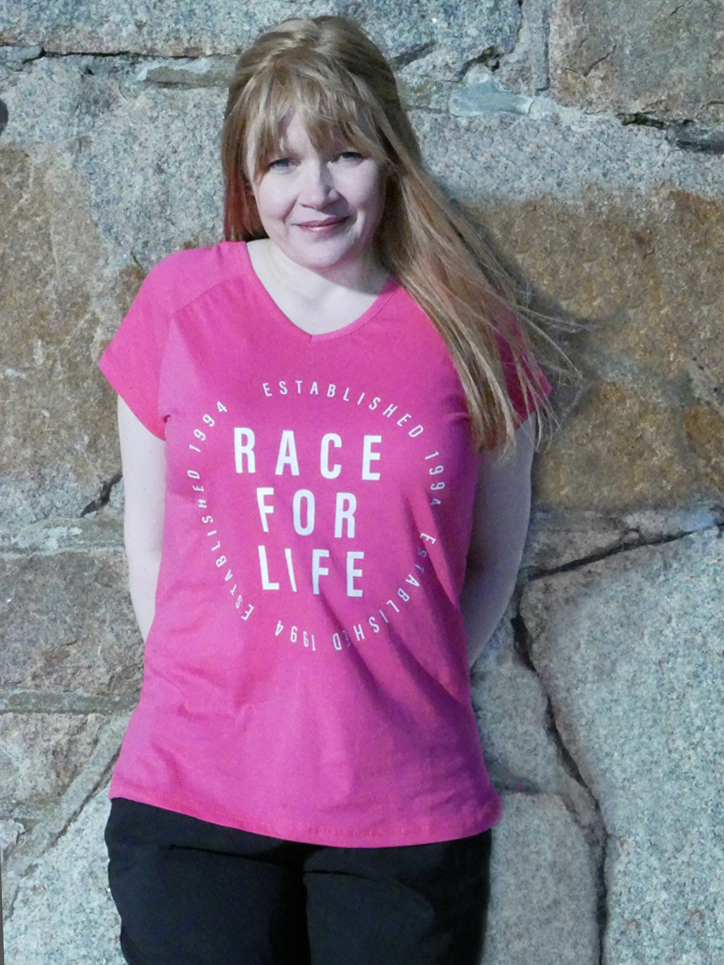
2nd wig - real hair
My mobility problems got worse again and I needed to take a sick bag with me everywhere. The vomiting left me exhausted, in excruciating pain and very weak. I was blacking out with no warning. I needed people to drive me to chemo, but I'd be vomiting the whole way there. Thank you amazing taxi driver who agreed to take me when I had no-one available to drive me! You have no idea how much that meant to me. Sometimes people didn't know where to put me, should I be in A&E so doctors could stop the vomiting or be up in Oncology.
About 2am one night we needed to call a GP out. I was in so much pain I just broke down sobbing. "I can't do this. I can't do this. I can't do this" over and over again.
My husband and I discussed stopping the treatment. He was amazing. We all want our loved ones to be with us as long as possible. But he could see what it was doing to me. He didn't think he had the right to ask me to keep going through that.
I was seeing Macmillan Jersey, they were an amazing support. One of their staff had an idea that it might help to see the Palliative Care doctor. So I saw the doctor and it turned out that the vomiting was psychosomatic. There wasn't a physical cause, it was my subconscious causing it to happen. Which is why it was so severe and medications weren't stopping it. I started seeing Palliative Care and working on the techniques they taught me. Slowly things started to improve.
Then after one of the cycles I started getting more and more breathless. I was a fit person and was training to do the 10k Race For Life for the first time. But if I climbed up 2 steps I had to stop and rest. A blood transfusion rectified that.
Thankfully I completed the chemotherapy. Scans showed it had shrunk my cancer.

I see Neurology and there are tests booked to try and find the cause of my mobility problems. Current thinking is it might be a reaction to the cancer itself, rather than to treatment. It does seem like I had signs of it before my cancer was diagnosed.
Don't doubt yourself. If something suddenly draws your attention get it checked out.
I've been privileged to be involved in both the initial Steering Group for Jersey's Cancer Strategy (first ever) and then to be asked to be involved again when the project was restarted post-Covid. My latest news is I was successful in interviewing for a voluntary position with the National Cancer Research Institute and have been allocated to a Breast Cancer Working Group.

The other side of life - there is one!
A pause button would have been amazing! But life didn't stop for cancer.
Shortly before finding the lump I heard about a job. It interested me and I applied. A few days after finding the lump I received an email. Would I attend an assessment event? From this point on I struggled. Do I withdraw from the application process?
My gut said I wouldn't survive this. I'd felt for many years that cancer was part of my future. It's why I was so careful to do monthly self-exams. But I know the statistics. And I've often reassured others that "most lumps are not cancerous". And "most cancers are curable if caught early".
My decision was to follow the advice I would give to others. Why create unnecessary fuss? An assessment day meant lots of competition. Still, for me it was tough. I felt I was being dishonest continuing with the process.
I received the initial diagnosis. "At least stage 2". Being stage 1 or 2 would have been great. Being stage 3 or 4 not so much. Still, it would have solved my dilemma. But stage 2 has very high survival rates. Stage 3 is quite a bit lower.
An invite to interview arrived. I still didn't know enough to cause a needless fuss. After the interview I got a call offering me the job. They weren't ready for anyone to start immediately. But my contract was on its way. So I had time for my biopsy results to come through.
At this point I made a decision. I set a date one week later. On that day I would ask to meet the employer. Regardless.
That date came and I didn't know anything more. So I asked to meet my new manager. Driving there I was anxious. I would have to discuss my breast cancer with a man I'd only just met. But he was easy to talk to. For that I was very grateful. He also had knowledge and understanding of breast cancer. I found myself cracking jokes and feeling relaxed.
They still wanted me to join. We would take it as it comes. So I signed my contract. My contractual start date was my very first day of chemotherapy! I still laugh at how nonplussed my colleagues were. This person they've just met has long hair. Then no hair. Head scarves then a short wig. Then I was bald cause it was summer and hot! Then a long wig. Then a 'number 2'. I still had short hair when shielding started. But I'll be returning with long hair.
They have handled my situation so well. And they've supported my fundraising events for cancer charities. I am incredibly grateful.

Diagnoses
April 2018
- Invasive Ductal Carcinoma
- stage 3
- ER+
- PR+
- BRCA2 mutation confirmed
- stage 3
- ER+
- HER2+
Treatments
- FEC-T (chemotherapy)
- Tamoxifen (receptor modulator)
- Carboplatin (chemotherapy)
- Trastuzumab (monoclonal antibody)
- Pertuzumab (monoclonal antibody)
- Phesgo™ (monoclonal antibody)
Surgeries
- Mastectomy and reconstruction
- Axillary Lymph Node Clearance (left side)
- Infraclavicular Lymph Node Dissection
- Axillary Lymph Node Dissection (node from right side)
- Port-a-cath insertion
- Bilateral Salpingo-Oophorectomy
* women, and gender non-confirming people born female
